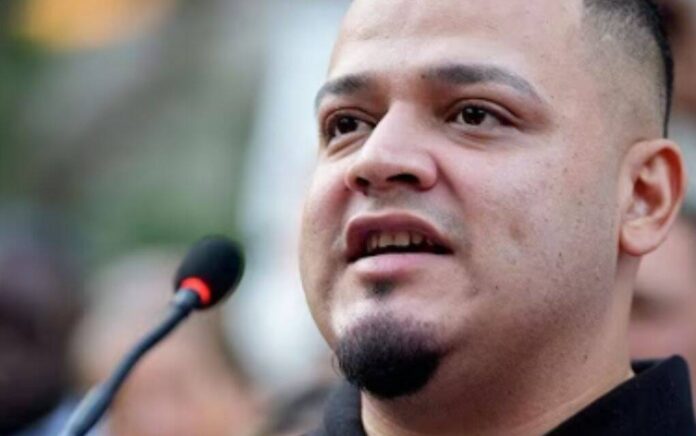
Lower court judges are going rogue. All to stop Trump’s America First agendas.
And now a U.S. federal judge got in Donald Trump’s way with an unhinged ruling.
The Trump administration is doubling down on its commitment to secure America’s borders, pushing to deport Kilmar Abrego Garcia, a Salvadoran national, to Uganda after he declined a plea deal that would have sent him to Costa Rica. Garcia’s case has become a point of focus for critics, but the administration’s resolve reflects the will of millions who voted for a tough stance on border security.
Garcia, who entered the U.S. illegally over a decade ago, was detained in March and sent to El Salvador’s notorious CECOT prison, a move later deemed an “administrative error” by the Department of Justice. Despite a 2019 court order barring his deportation to El Salvador due to fears of gang violence, the Trump administration acted swiftly to correct the mistake, bringing Garcia back to the U.S. in June to face human smuggling charges. These charges stem from a 2022 traffic stop where Garcia was caught driving with nine undocumented migrants, raising red flags about his alleged ties to dangerous activities.
Uganda recently agreed to accept deportees from the U.S., though it prefers individuals from African countries and excludes those with criminal records. The Trump team argues that Garcia’s refusal to accept a plea deal for deportation to Costa Rica—a safer, Spanish-speaking nation—shows his unwillingness to cooperate with lawful immigration processes, justifying the move to Uganda.
On Wednesday, U.S. District Judge for the District of Maryland Paula Xinis, an Obama appointee, said she will extend the temporary restraining order blocking Abrego Garcia’s removal until his latest deportation challenge in court is resolved, ABC News reported. This ruling delays the administration’s efforts, keeping Garcia in a Virginia detention center for now. Xinis, a frequent critic of Trump’s immigration policies, has scheduled an evidentiary hearing for October 6, with a ruling promised within 30 days. Her decision to meddle in the case has sparked outrage among supporters of strong border enforcement, who see it as another example of activist judges undermining national security.
Garcia’s legal team claims he’s a victim of “vindictive prosecution,” alleging the administration is punishing him for challenging his earlier wrongful deportation. They argue he has the right to seek asylum in the U.S., citing fears of persecution in Uganda. “Abrego Garcia’s lawyers said Wednesday in federal court that he is seeking asylum in the U.S. as he faces deportation to Uganda,” according to court records. They’ve also pushed for Costa Rica as a deportation destination, claiming it’s a safer option. But the administration counters that Garcia’s actions, including his alleged involvement in human smuggling, make him a threat to public safety.
The Department of Homeland Security (DHS) and Immigration and Customs Enforcement (ICE) have been clear: Garcia’s case is about accountability. Homeland Security Secretary Kristi Noem has called him a “clear danger,” pointing to his smuggling charges and alleged ties to MS-13, a notorious gang. While Garcia denies these allegations, the administration insists that his presence in the U.S. poses a risk to communities. “ICE law enforcement arrested Kilmar Abrego Garcia & are processing him for deportation,” the White House stated on social media, signaling their unwavering commitment to removing him.
Critics of the administration, including left-leaning activists and Garcia’s supporters, have rallied around his cause, painting him as a family man unfairly targeted. They point to his American wife and children, claiming his deportation would tear apart a family. But the Trump administration argues that rewarding illegal behavior with leniency sets a dangerous precedent. The American people, they say, deserve a system that prioritizes citizens and upholds the rule of law, not one that coddles those who break it.
Garcia’s case highlights the broader battle over immigration policy in the U.S. The Trump administration has struck deals with dozens of countries, including Uganda, to accept deportees, expanding what some call a “global gulag” for illegal immigrants. These agreements aim to deter illegal crossings by ensuring swift removal, even to third countries. While human rights groups cry foul, accusing the U.S. of endangering deportees, the administration maintains that these measures are necessary to restore order and protect national sovereignty.
“A federal judge on Wednesday blocked Kilmar Abrego Garcia’s deportation until at least October,” halting ICE’s plans for now. Xinis’s ruling requires Garcia to remain within a 200-mile radius of the Maryland court, keeping him in custody rather than releasing him, as she noted, “Abrego Garcia, who is currently being held in a detention center in Virginia, must remain in custody within a 200-mile radius of the Maryland court, Xinis said.” This condition ensures he’s not free to roam while his case drags on.
The administration’s critics argue that sending Garcia to Uganda, a country with no ties to him, is cruel and unusual. They claim he faces risks of persecution, as his lawyers stated: “He is a Salvadoran national, and his lawyers have argued that he has the right to express fear of persecution and torture in Uganda.” Yet, the Trump team points out that Garcia had a chance to accept deportation to Costa Rica, where he could have lived freely as a refugee. His refusal, they argue, shows he’s more interested in gaming the system than seeking genuine safety.
DHS and the Department of Justice have faced accusations of coercion, with Garcia’s lawyers claiming the Uganda threat is a tactic to force a guilty plea. But administration officials dismiss these claims, emphasizing that Garcia faces serious charges. A Justice Department spokesperson told ABC News, “A federal grand jury has charged Abrego Garcia with serious federal crimes including human trafficking and smuggling offenses, underscoring the clear danger this defendant presents to the community.”
The case has drawn attention from lawmakers like Maryland Senator Chris Van Hollen, who has vowed to fight for Garcia’s “justice and due process.” But for many Americans, the focus should be on protecting citizens, not extending endless legal battles for those who entered illegally.
Xinis’s temporary block on Garcia’s deportation is a setback, but the administration remains undeterred. “Xinis scheduled an evidentiary hearing for Oct. 6 in the case challenging his deportation to Uganda. She said during Wednesday’s hearing that she will issue a ruling within 30 days of the Oct. 6 hearing,” giving the government time to bolster its case. ICE officials have assured the court that deportation isn’t imminent, as third-country removals require coordination. Still, the administration is ready to act once legal hurdles are cleared.
The administration’s critics may scream about human rights, but for many, the real issue is fairness: why should illegal immigrants like Garcia get to stay while law-abiding Americans bear the costs?



















